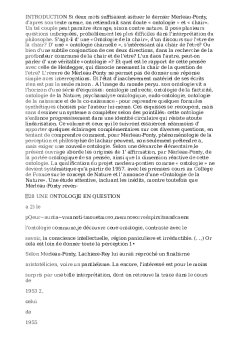Centre sevres facultes jesuites de paris archives de philosophie
Centre Sèvres ?? Facultés jésuites de Paris LA THÉORIE CRITIQUE UNE PENSÉE DE L'EXIL Author s Miguel ABENSOUR Source Archives de Philosophie Vol No AVRIL-JUIN pp - Published by Centre Sèvres ?? Facultés jésuites de Paris Stable URL http www jstor org stable Accessed - - UTC Your use of the JSTOR archive indicates your acceptance of the Terms Conditions of Use available at http about jstor org terms JSTOR is a not-for-pro ?t service that helps scholars researchers and students discover use and build upon a wide range of content in a trusted digital archive We use information technology and tools to increase productivity and facilitate new forms of scholarship For more information about JSTOR please contact support jstor org Centre Sèvres ?? Facultés jésuites de Paris is collaborating with JSTOR to digitize preserve and extend access to Archives de Philosophie This content downloaded from on Mon May UTC All use subject to http about jstor org terms CArchives de Philosophie - LA THÉORIE CRITIQUE UNE PENSÉE DE L'EXIL par Miguel ABENSOUR à Edmond A El Maleh RÉSUMÉ Cet essai tente de décrire les lignes de force de la théorie critique dé ?nie comme une pensée de Vexilt ou de ce que Von appelle à tort r L 'école de Francfort ? Les principaux thèmes abordés sont l'unité ou la pluralité de la théorie critique la relation au marxisme la t? che émancipatrice de la philosophie la place de la question politique dans la théorie critique On pourrait distinguer non pas deux théories critiques comme le soutenaient Horkheimer et Marcuse mais plutôt trois formes en mettant en lumière une théorie critique k intermédiaire ? entre et qui correspondrait à une radicalisation de la théorie et à une redécouverte du politique Quelle serait alors la relation entre cette troisième théorie critique et la pensée d'Adorno Ce qui conduit à une autre question la relation complexe entre Adorno et W Benjamin ne constituerait-elle pas une dimension cachée de la Théorie critique SUMMARY This essay attempts to describe the main lines of critical theory presented as a thought of exile or of the so wrongly called Frankfurt School The principal themes are the unity or the plurality of the critical theory the relationship of critical theory to marxism the function of philosophy in the struggle for emancipation the political question in critical theory One could distinguish not two critical theories as Horkheimer and Marcuse thought but rather three forms of the critical theory by insisting upon an intermediary phase between and which corresponds to a radicalization of critical theory and a rediscovery of politics The author tries to discover the relationship between this third critical theory and the peculiarity of Adorno' s thought Thus a new question arises is not the complex relationship between W Benjamin and Adorno a hidden dimension of critical theory Comment dé ?nir la Théorie critique Est-ce une école un lieu un dogme Historiquement il para? t plus exact et plus satisfaisant de Ce texte qui se veut
Documents similaires










-
38
-
0
-
0
Licence et utilisation
Gratuit pour un usage personnel Aucune attribution requise- Détails
- Publié le Jan 20, 2022
- Catégorie Philosophy / Philo...
- Langue French
- Taille du fichier 113.4kB


